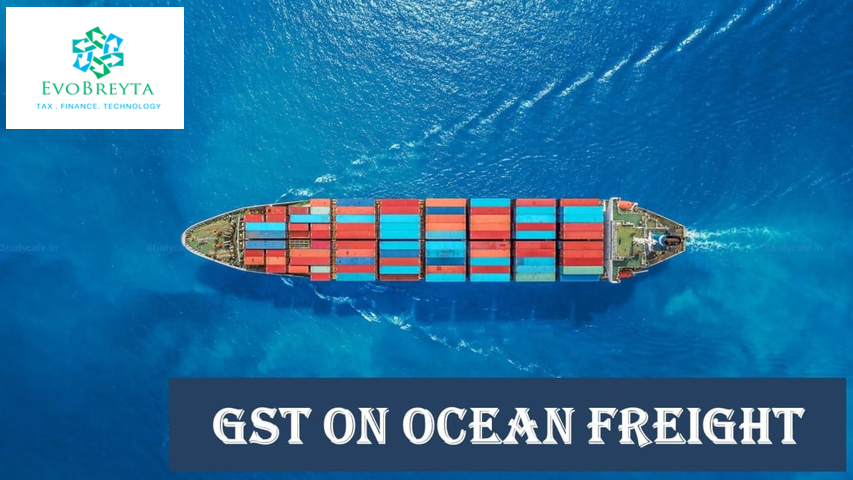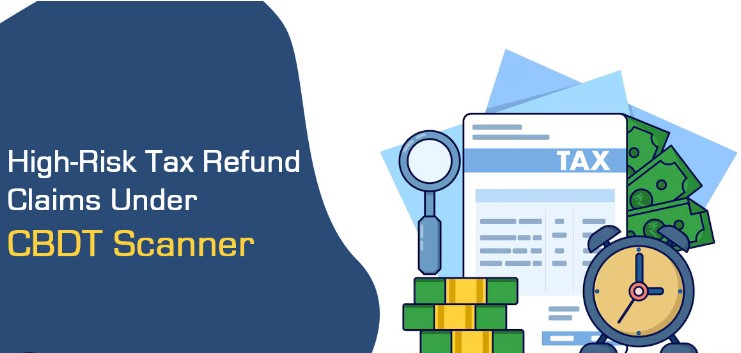
GST on Ocean Freight: Whether the Dust has Settled After Recent Amendments and Notifications
Published In : Taxsutra Download
Author : Navneet Singal
GST on Ocean Freight: Whether the Dust has Settled After Recent Amendments and Notifications.
Famous Tax lawyer, Dr. Michael Robson has quoted that,
“Tax disputes are on the rise but there are a number of ways to avoid escalation of the dispute.”
Owing to the involvement of numerous stakeholders and different types of payments, the Goods and Service Tax (or "GST") on ocean freight has been a subject of controversy since its introduction. It has become extremely complicated as a result of several notifications, amendments, and the Supreme Court and High Court’s rulings.
The most recent changes made by the Finance Act of 2023 and the notifications issued by the Central Government on September 26, 2023, have helped to lessen the commotion and make the process of determining the GST on ocean freight more understandable than it was before.
In this article, the author has attempted to analyse what ocean freight is, terminology used in shipping services, the impact of recent amendments by the Finance Act, 2023, notifications issued, and the justification behind the issue of these changes under the following points:
I. What is ocean freight? Analysis of terminology used in shipping services.
II. GST on ocean freight
III. Types of ocean freight for the applicability of GST
(a) GST on outbound shipping services (Ocean Freight on Export of Goods)
(b) GST on inbound shipping services (Ocean Freight on import of Goods)
IV. Conclusion
I. What is ocean freight? Analysis of terminology used in shipping services.
Ocean freight, also called sea freight, is the movement of goods internationally by sea. Ocean freight is far and away the most popular option for shipping goods internationally. Roughly 90% of goods[1] are transported around the world by sea.
There are four major types of shipping terms known as incoterms (International Commerce Terms), which set out clear definitions for where the goods are dispatched from and to.
· EXW, or Ex-Works means the supplier transports the goods to the factory or manufacturer.
· FOB, or Free on Board, which delivers to the port or terminal in the country of the supplier.
· CIF, or Cost, Insurance and Freight, which covers transport to the buyer’s country
· DAP/ DDU, or Delivery at Port / Delivery and Duty, Unpaid, which delivers all the way to your facility or warehouse, excluding the cost of tariffs and taxes.
II. GST on ocean freight
According to Section 7 of the CGST Act[2], there must be a supply of goods, services, or both in order to be subject to the GST. When commodities are carried from or to any foreign port, the Indian GST on ocean freight becomes apparent. It would be obvious that the shipping line's transportation activity qualifies as a service and is subject to GST.
(a) Recipient of supply of services: Clause (a) and (c) of Section 2(93) of the CGST Act, 2017 define, that, ‘recipient of supply of goods or services or both wherein it specifies that where a consideration is payable for the supply of services, the person who is liable to pay that consideration and where no consideration is payable, the person to whom the service is rendered.
For the purpose of ocean freight borne, we generally categorise it into two types, i.e.,
(i) CIF - No separate transportation charges are imposed on the importer by the supplier, then the value charged on the goods is called CIF value. The recipient of goods pays the amount mentioned in the invoice raised by the exporter.
(ii) FOB - Where the importer has hired the ocean freight service provider and makes the payment for the transportation of goods.
Hence, in the case of a CIF, the exporter who has contacted the shipping line and paid the freight is the recipient of the service of transportation of goods. On the other hand, in a FOB transaction where the importer has hired the ocean freight service provider and makes the payment for the transportation of goods, the importer can be considered the recipient of services under GST. However, it is still to be remembered that the liability for payment of the GST is that of the person who has paid the consideration for freight.
(b) Rate of Tax: Upon referring to Notification No 11/2017[3] – CGST (Rate) vide entry 9 (ii), the rate of GST applicable is 5% subject to certain input tax credit restrictions. The service provider can also opt for charging 18% GST with ITC benefit.
III. Types of ocean freight for the applicability of GST
On the basis of the destination of goods, the type of servicers can be categorized in two types, i.e., outbound services, where the goods move from India to overseas countries, and inbound services, where the goods move from overseas countries to India.
(a) GST on outbound shipping services (Ocean Freight on Export of goods)
Outbound shipping services are services when goods are transported through vessels or ships via shipping lines from India to outside India. Now the question arises that what type of the tax need to be paid, i.e., IGST or CGST+SGST which is determined by the place of supply of goods. Section 12 and 13 of IGST Act, defines the place of supply which has been recently amended by Finance Act, 2023 to remove the confusion regarding availment of ITC and other unnecessary complications. The amendment made by Finance Act, 2023 has been notified by Notification No. 28/2023[4]-Central Tax w.e.f. 01.10.2023.
(i) Amendments made by the Finance Act, 2023, applicable w.e.f. 01.10.2023
As per section 12 (8) of IGST Act, the place of supply of services by way of transportation of goods, including by mail or courier to, –
(a) a registered person, shall be the location of such person;
(b) a person other than a registered person, shall be the location at which such goods are handed over for their transportation.
Provided that where the transportation of goods is to a place outside India, the place of supply shall be the place of destination of such goods.
This proviso is inserted vide IGST (Amendment) Act, 2018 w.e.f. 01-02-2019, has been removed by the Finance Act, 2023. The said proviso will not affect the taxability of the transaction but only affects the nature of tax, i.e., CGST/SGST or IGST, to be discharged.
As per Section 13 (9) of IGST Act, the place of supply of services of transportation of goods, other than by way of mail or courier, shall be the place of destination of such goods. The Finance Act, 2023 has omitted the 13(9) of the IGST Act.
After reading the amended situation, it can be interpreted that the place of supply would be the residual entry u/s 13(2) of the Act, i.e., the location of the recipient of services would be the place of supply of services in cases of transportation of goods other than by mail or courier.
|
Particulars |
Before amendment |
After amendment |
|
Supply of transport services by a Foreign Shipping Line located outside India to an exporter located in India for transporting goods from India to the UK |
As per section 13(9) as the place of supply of such services is the place of destination of goods, i.e., UK. So, it is not an Import of Service, hence not liable to GST |
Now the place of supply of such services will be governed by Section 13(2). As the place is the location of the recipient of the service, i.e., India. So, it will be an import of service, hence liable to GST. |
It is to further mention that the outbound shipping services were exempt from GST for the period from 25.01.2018 to 30.09.2022 vide Notification No. 02/2018[5] IGST (Rate) dt. 25/01/2018 (inserted Entry No 20B).
(ii) Analysis/Justification behind the amendments
The amendment was made to provide a level playing field for Indian and foreign shipping lines. Export freight charged by Indian Shipping Line to an Indian exporter is taxable, and the place of supply is determined as per Section 12(8) of the IGST Act 2017. But freight charged by Foreign Shipping Line was not taxable as supply by Foreign Shipping Line to an Indian exporter for transport of goods to a place outside India (Section 13(9) of the IGST Act 2017). Because the place of supply was out of taxable territory, it was not an import of a service and hence not liable to GST.
Due to the above reason, Indian exporters were preferring Foreign Shipping Line over India Shipping Line. So, there was a need to change the place of supply for such services under section 13 (9) of the IGST Act 2017 from “place of destination of goods” to the “location of the recipient of service”.
(iii) Gist of the different scenarios of Outbound Shipping Services post amendments by Finance Act, 2023
|
Service Provider |
Service Recipient |
Place of Supply |
CGST/SGST or IGST |
|
Karnataka |
Karnataka |
Karnataka |
CGST/SGST (FCM) |
|
Rajasthan |
Karnataka |
Karnataka |
IGST (FCM) |
|
USA |
Karnataka |
Karnataka |
IGST (RCM) |
|
Karnataka |
USA |
USA |
Zero Rated or IGST if the export conditions are not satisfied |
|
UK |
USA |
Outside GST Purview |
Not Applicable |
(b) GST on Inbound shipping services (Ocean Freight on import of goods)
Inbound shipping services are those shipping services when goods are transported through vessels/ships via shipping lines from Outside India to India. Unlike outbound Ocean freight, there was no exemption provided for inbound Ocean freight.
(i) Amendments made by the Notification No. 13/2023 w.e.f. 01.10.2023
In accordance with Entry 1 of Notification No. 10/2017[6], in case of any service supplied by any person who is located in a non-taxable territory to any person other than non-taxable online recipient (i.e., import of service), the person located in the taxable territory other than non-taxable online recipient should discharge GST under reverse charge. The Notification, impose liability of payment of GST on the importer in respect of import of services on the RCM (reverse charges mechanism). Further Entry 10 of the said notification (supra) had made it applicable on the Ocean Freight which has been removed by the recent Notification No. 13/2023[7] issued by the central government on September 26, 2023 w.e.f. Oct 1, 2023, on the recommendation of the GST Council. The central government has also issued the Notification No. 11/2023[8] and 12/2023[9], as consequent amendments in the rate and exemption notification issued in the Year 2017 (i.e., Notification No. 8/2017[10] and Notification No. 9/2017[11]).
(ii) Analysis/Justification for issue of Notification No. 13/2023
The Notification No. 11/12/13 (Supra) have been issued to make amendments in earlier Notifications following the Landmark Judgment of the Supreme Court in the case of Union of India vs. Mohit Minerals, Dated: 19.05.2022[12], in which, the Apex Court had ruled that, an Indian Importer is not subject to IGST under RCM on payments of for ocean freight made by a foreign seller to a foreign shipping line, since the importer already is required to pay IGST as a component of customs duty, on the “Cost-insurance-freight” (CIF) value of the goods. The court upheld a, Gujrat High Court decision of Year 2020[13].
Even though, the order of the SC, upholding the decision of the Gujarat High Court should be applicable from beginning of the applicability of the GST on the above-mentioned scenario, however, the notification issued in this case has been made applicable from October 1, 2023 to give effect to the SC decision.
(iii) Gist of the different scenarios of Inbound Shipping Services post issue of Notification w.e.f. 01.10.2023:
|
Service Provider |
Service Recipient |
Place of Supply |
CGST/SGST or IGST |
|
Karnataka |
Karnataka |
Karnataka |
IGST (FCM) |
|
Rajasthan |
Karnataka |
Karnataka |
CGST/SGST (FCM) |
|
USA |
Karnataka |
Karnataka |
IGST (RCM) |
|
Karnataka |
USA |
Outside India |
Zero Rated or IGST if the export conditions are not satisfied |
|
UK |
USA |
Outside India (CIF Basis) |
Not Applicable *w.e.f. Oct 1, 2023 |
IV. Conclusion
Based on the thorough analysis, it can be said that, with the exception of a few particular cases that have been outlined in the tables above, GST is applicable on outbound or inbound shipping services at a rate of 5% without ITC and 18% with ITC. Additionally, it has been made clear by the recent Notification No. 13/2023 that no RCM is applicable where a foreign supplier provides the transportation service to a foreign recipient and the goods are received by an Indian importer on a CIF basis. This amendment affirmed the Supreme Court's ruling in the UOI v. Mohit Mineral case (supra).
The litigation over the retrospective or prospective nature of the notifications and their impact during the unamended period, as well as other issues raised by the SC while dealing with the issue of ocean freight in the case of UOI vs. Mohit Minerals Pvt Ltd, cannot be avoided, despite the fact that the central government has made every effort to resolve the GST on the ocean freight issue. A glimpse of these issues can be found as follows:
(i) The Apex Court deliberated at length on the larger issues of constitutional framework of GST law and concepts such as co-operative federalism and concluded that recommendations of the GST Council are not binding on the Centre or the States and that the Central government and States have simultaneous powers to legislate on matters of GST. This is a significant pronouncement that calls for a meticulous study to fathom the possible ramifications not only on other statutes, but about Centre-state ties within the broader federal structure.
(ii) Refund of IGST already paid under Reverse Charge Mechanism may be applied for and reliance can be placed on several judgments of High Courts where refund of IGST paid on ocean freight beyond limitation period prescribed under GST Law has been allowed.
(iii) GST authorities can issue notices for payment of tax under RCM on the ocean freight paid as a part of the consignment on CIF basis during the unamended period as the Notification has been made effective prospectively.
Tax laws needs to be short, easy to understand, and straightforward. The taxpayers ought to have certainty as a result. It is a mammoth undertaking due to the constantly changing nature of transactions from the physical to the digital worlds, the large number of stakeholders, thousands of potential interpretations, and the unpredictable dynamics of the global economy. Steven LaTourette, has famously, said that,
“Our tax code is so long it makes War and Peace seem breezy.”
[1] http://rosegeorge.com/site/books/ninety-percent-of-everything
[2] Central Goods and Service Tax Act, 2017
[3] Notification No. 11/2017 Dated 28-06-2017 (Central Tax – Rate)
[4] Notification No. 28/2023-Central Tax, Dated 31.07.2023
[5] Notification No. 02/2018 IGST (Rate) dt. 25/01/2018 (inserted Entry No 20B)
[6] Entry 1 of Notification No. 10/2017 – IGST (Rate), Dated: 28.06.2017
[7] Notification No. 13/2023 – IGST(Rate), Dated: 26.09.2023
[8] Notification No. 11/2023 – IGST(Rate), Dated: 26.09.2023
[9] Notification No. 12/2023 – IGST(Rate), Dated: 26.09.2023
[10] Notification No. 08/2017 – IGST(Rate), Dated: 28.06.2017
[11] Notification No. 09/2017 – IGST(Rate), Dated: 28.06.2017
[12] Union of India vs. Mohit Minerals Pvt Ltd (SC), Civil Appeal No. 1390 of 2022, Dated: 19.05.2022
[13] Mohit Minerals Pvt Ltd vs Union of India, Gujarat High Court, SCA No. 726 of 2018, Dated: 09.02.2018





